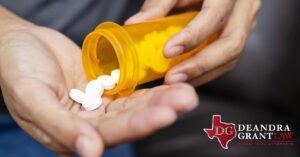Many people are required to take daily medications in order to live a healthy life. You can be charged with DWI for being under the influence of illegal drugs, but what about the ones you are prescribed?
 DWI of Prescription Drugs
DWI of Prescription Drugs
A number of prescription drugs have strong side effects, some of which can impact a driver’s ability to safely operate a vehicle.
Examples of side effects include:
- Dizziness
- Drowsiness
- Weakness
- Nausea
- Problems with coordination
Many people who take medication and experience these side effects are unaware that they are at risk of being charged with DWI. While driving on prescription medication is not a crime in and of itself, driving while impaired by the side effects of prescription medication is.
DWI of Over-The-Counter Medication
Did you know that the medication you get on the drugstore shelf could potentially lead you to get a DWI? Sleep aids, cough medicine, allergy medication, and more could have similar side effects to prescription medications, causing the user to be impaired behind the wheel.
In fact, some of these over-the-counter medications even contain alcohol. While the percentage alone may not be high enough to cause impairment, it could potentially show up on a breathalyzer test. It could also increase your blood alcohol concentration (BAC) if you drink alcohol in combination with taking a liquid medication, such as cough syrup or DayQuil.
Drug Interactions
Always take note of drug interactions or warnings before drinking while on medication. You may also ask your doctor or pharmacist for insight. Many medications come with a warning that you should not drink after taking the dosage. Doing so could cause physical harm or significantly increase the effects of the alcohol.
Medications that commonly interact with alcohol include:
- Anxiety medications
- Sleeping aids
- Muscle relaxants
- Cholesterol medication
- Blood pressure medication
- Antibiotics
Medical Marijuana
Medical marijuana was recently legalized in Texas for individuals with qualifying conditions. It’s important to note that driving under the influence of medical marijuana is a crime.
Evidence in a DWI of Drugs Case
For DWI of alcohol cases, breath test results are one of the most important pieces of evidence. Breath test results are a quantitative estimate for the amount of alcohol in one’s blood. For DWI of drugs, breath tests are not useful. Instead, the police must prove DWI of drugs through other methods.
- Driver confession: If a driver admits they have recently taken medication, the officer can use this information to help prove they are impaired by a substance, even if it is legal. Therefore, drivers should not disclose what medications they’ve taken prior to the DWI stop.
- Field sobriety tests: Officers may rely on field sobriety test results to show the driver’s physical impairment. If the driver is unable to balance or shows a lack of coordination, they may be charged with DWI of drugs.
- Blood tests: In some cases, the officer may require the driver to take a blood test. These results can show the presence of a drug in their system.
Implied Consent
It’s important to understand implied consent laws so you can make informed decisions throughout your DWI stop.
Chemical tests. Chemical tests are covered under implied consent laws. This means that if the police request that a driver takes a breath, blood, or urine test, the driver must comply. If they don’t, their license can be suspended as a punishment.
Field sobriety tests. Many know that there is a penalty for not taking chemical tests, but many also falsely assume that there is a penalty for refusing to take field sobriety tests. This is not the case. There is no penalty for refusing field sobriety tests. Taking field sobriety tests only benefits the officer, who will be paying close attention to any errors in your performance. Therefore, you should always refuse to take these tests.
Dallas, Texas DWI Defense
If you are facing unexpected DWI charges after taking legal drugs or medication, contact our team at Deandra Grant Law for legal assistance. Our team has in-depth scientific knowledge that we can leverage to create a strong defense for your DWI of drugs case in Texas.
